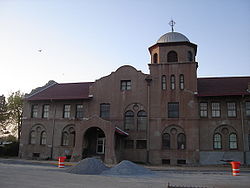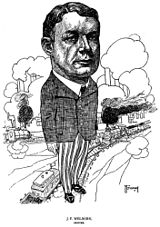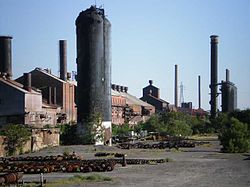- Colorado Fuel and Iron
-
The Colorado Fuel and Iron Company (CF&I) was a large steel concern. By 1903, it was largely owned and controlled by John D. Rockefeller and Jay Gould's financial heirs.[1] While it came to control many plants throughout the country, its main plant was a steel mill on the south side of Pueblo, Colorado and was the city's main industry for most of its history. From 1901 to 1912, Colorado Fuel and Iron was one of the Dow Jones Industrials. The steel-market crash of 1982 lead to the decline of the company. After going through several bankruptcies, the company was acquired by Oregon Steel Mills and recently changed its name to Rocky Mountain Steel Mills. In January 2007, along with the rest of Oregon Steel's holdings, was acquired by Evraz Group SA, a Russian steel corporation, for $2.3 billion.
Contents
History
Railroad magnate William Jackson Palmer's Colorado Coal and Iron Company created the Bessemer steel plant in the 1880s.[2] John Cleveland Osgood founded Colorado Fuel Company in 1883.[3] These two companies merged in 1892 to form Colorado Fuel and Iron.
The facility operated a number of blast furnaces until 1982. The main blast furnace structures were torn down in 1989, but due to asbestos content, many of the adjacent stoves and support buildings still remain. The stoves and foundations for some of the furnaces can be easily seen from Interstate 25, which runs parallel to the plant's west boundary.
Other holdings
Through the process of vertical integration, the company came to own more than just the main steel plant. Over the course of a century, CF&I operated coal mines throughout southern Colorado, as well as iron mines in Wyoming and Utah, limestone quarries, smaller mines for other materials going into the steel making process, and the Colorado and Wyoming Railway. The Colorado Supply company store was also owned and operated by CF&I. They also came to control many furnaces throughout the country including E.G. Brooke in Birdsboro, PA.
Labor incidents
Over the course of its history, the company has had numerous major labor disputes. CF&I was accused of brutality against the UMWA in a strike called by that organization in 1903-04. The best known strike culminated in the infamous Ludlow Massacre at the Ludlow Depot, a stop on the Colorado and Southern Railroad which was near several coal mines, in 1914.[4] Evidence from CF&I's archives reveals that the company infiltrated, propagandized against, and attempted to disrupt the Industrial Workers of the World, who had called a statewide coal strike, which resulted in another massacre of striking coal miners in 1927.
In 1997, the steelworkers union in Pueblo voted to strike over alleged unfair labor practices. The old CF&I facility, under new ownership, hired permanent replacement workers, leading to further tension between the new employer and the union.
However in September 2004, local unions 2102 and 3267 won both the strike and the unfair labor practice charges. All of the striking steel workers were returned to their jobs, and the company was forced to repay a record amount of back pay to all of the striking steel workers for the 7 years of the strike. Some[who?] have called this a significant win for labor and the many families affected by the seven-year strike.
The site today
In addition to the blast furnace/open hearth steelmaking process, CF&I also used the basic oxygen furnace (BOF) process for a number of years. This process was later replaced by electric arc furnaces (EAF). Currently, two EAFs are used at the facility to convert scrap to steel billets of various sizes. The billets are then distributed to the three steel finishing facilities (rail mill, rod & bar mill, seamless tube mill) for processing into the various finished products.
Several of the administration buildings, including the main office building, dispensary, and tunnel gatehouse have been purchased by the Bessemer Historical Society to house their Steelworks Museum of Industry and Culture and the CF&I Archives.
Out of the many production and fabrication mills which once existed on the site, only the steel production (electric furnaces, used for scrap recycling), rail, rod & bar, and seamless tube mills are still in operation. The wire mill was sold in the late 1990s to Davis Wire, which still runs it and produces products such as fence and nails under the CF&I brand name. In the fall of 2006, expansion plans for the rail mill were announced. Once completed, the mill will be able to produce rail lengths of up to 480 feet (up from the current 80 feet), lengths currently possible only in a few European plants.
See also
Steelworks Museum of Industry and Culture
References
- ^ Lehman Brothers Archives Online
- ^ William Wyckoff, Creating Colorado: the making of a western American landscape, 1860-1940, 1999, page 147.
- ^ James Whiteside, Regulating danger: the struggle for mine safety in the Rocky Mountain coal Industry, U of Nebraska Press, 1990, page 8.
- ^ James Whiteside, Regulating danger: the struggle for mine safety in the Rocky Mountain coal industry, U of Nebraska Press, 1990 (preface)
External links
Categories:- Ironworks and steel mills in the United States
- Economy of Colorado
- Pueblo, Colorado
- Companies based in Colorado
- Former components of the Dow Jones Industrial Average
Wikimedia Foundation. 2010.




